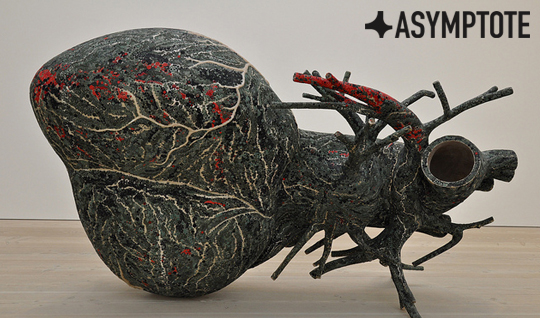‘I want to buy my way to everything’: halfway through Ursula Andkjær Olsen’s Third-Millennium Heart (excerpted in the Asymptote Fall 2015 issue), the shape-shifting, double-tongued voice declares yet another sweeping and futile desire. Translated from the Danish by Katrine Øgaard Jensen, this collection is a text much like the many-chambered place that is third-millennium heart, with intersecting meditations on the human body and its connection to the natural world, which evolve into a solid critique of late capitalism, especially in relation to reproduction. Throughout, there is a disconnect between necessity and excess, the architecture of human consumption, a tussle between the body’s need and desire for more. During this email interview, Olsen makes me a list of Danish words for the parts of the body, and the etymology is fascinating. Moderkage, Danish for ‘placenta’, would literally translate into ‘mother cake’; livmoder, the word for ‘uterus’, into ‘life mother’. Following is the interview between Ursula Andkjær Olsen and her English translator, Katrine Øgaard Jensen.
Sohini Basak: I want to begin with names and naming and the body, because that’s where the book (and our language, for that matter) begins. When you were young, Ursula, what language did you learn about the body? Science, especially medical science, uses the English language (and Latin, for nomenclature), so I’m curious to know . . . what were the first names you learnt for the heart, its ventricles, chromosomes, all of which form the structure of this collection?
Ursula Andkjær Olsen: My mom was a doctor, so I think the naming of the body for me was a mix of Danish and Latin. I was always very fascinated with the scientific approach to the body (in fact I studied medicine for almost two years before changing to musicology and philosophy), and I remember, as a little girl, poring over a book of photographs of the body’s insides, beautiful pictures by Swedish photographer Lennart Nilsson. And doing it again and again. All these cavities, canals, soft corners, bridges, chambers! It was a kind of architecture, in fact.

